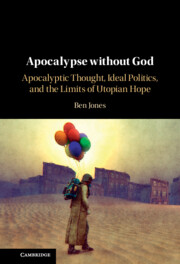Acknowledgments
Research for this book began during my time in graduate school at Yale University. There Karuna Mantena and Steven Smith provided helpful feedback and guidance from the start when I was just brainstorming ideas. I also benefited from conversations with John Collins and John Grim, whose wealth of knowledge on religion proved invaluable. I am especially grateful to Bryan Garsten who advised my dissertation, which through much transformation eventually became this book. The Beinecke Scholarship Program deserves special thanks for helping fund my graduate studies during early work on this project.
I am indebted to William Altman, Roland Boer, Daryl Cameron, Chris Costello, Greg Crofford, Kyle Haines, Robynn Kuhlmann, Ben Laurence, Désirée Lim, Lorraine McCrary, Alison McQueen, Shmuel Nili, John Parrish, Emily Ray, Don Thompson, David Wiens, and Arthur Williamson, who all read parts of the manuscript and provided valuable feedback on it. Burke Hendrix, whose work on ideal and nonideal theory deeply influenced my own thinking, was incredibly generous in providing extensive comments on sections of the manuscript and talking through ideas I was wrestling with.
Sheila Denion proofread the entire manuscript, and I greatly appreciate her assistance and attention to detail. Chapter 4 benefited from conversations and correspondence with Patrick Callahan, Harro Höpfl, Al Martinich, and Stefania Tutino. That chapter partly draws on arguments from my article “The Natural Kingdom of God in Hobbes’s Political Thought,” History of European Ideas 45, no. 3 (2019): 436–53, © 2018 Taylor & Francis, available online: www.tandfonline.com/doi/figure/10.1080/01916599.2018.1548810.
I presented research from this project at a number of venues: the New England Political Science Association Annual Meeting (2015), American Political Science Association Annual Meeting (2015 and 2016), Great Plains Political Science Association Annual Meeting (2015), American Philosophical Association Eastern Meeting (2017), Department of Political Science at the University of Kansas (2017), Western Political Science Association Annual Meeting (2017), Midwest Political Science Association Conference (2018), and Moral Agency Workshop at Penn State (2020). Those audiences introduced me to new perspectives and pushed me to develop what hopefully is a more compelling account of apocalyptic thought’s relationship to politics.
Sections of Part I, in particular much of Chapter 2, previously appeared in my article “The Challenges of Ideal Theory and Appeal of Secular Apocalyptic Thought,” European Journal of Political Theory 19, no. 4 (2020): 465–88, © 2017 Ben Jones, DOI: 10.1177/1474885117722074. The review process for that article played a key role in sharpening the book’s argument. I am grateful to the journal’s editors and two anonymous reviewers for the care they showed in evaluating the manuscript and for their detailed suggestions.
At Cambridge University Press, I have been fortunate to have a terrific editor in Robert Dreesen. His guidance helped transform my manuscript into the book you see today and improve it in countless ways. Two anonymous reviewers offered extensive and valuable suggestions, which helped bring the different strands of my argument together in more cogent form. I am thankful to the reviewers, Robert, and the rest of the team at Cambridge University Press for their significant investments in the project.
I completed work on this book at the Rock Ethics Institute at Penn State, which provided a rich intellectual environment and could not have been more supportive. Ted Toadvine, the institute’s director, deserves special thanks for his encouragement and sage recommendations. A grant from the TOME (Toward an Open Monograph Ecosystem) Initiative at Penn State made this book available in an open access edition. I am thankful for that generous support, and in particular to Ally Laird of the Penn State University Libraries for all the help she provided in answering questions about the grant and application process.
I could imagine no better partner on the journey of writing this book than my wife Mackenzie Jones. As I wrote and rewrote the manuscript, she read various parts of it, which benefited from her insights and suggestions. She also provided the image in Chapter 5. Beyond those specific contributions, her compassion, patience, and encouragement were constant throughout the project’s development – both its high and low points – for which I am deeply grateful.
I would be remiss not to mention one other member of our family, our dog Barlow. It’s hard to imagine anyone matching his enthusiasm for joining writing sessions in my home office. He spent many hours and long nights at my feet as this manuscript slowly took form, making the lonely task of writing a bit less so.

